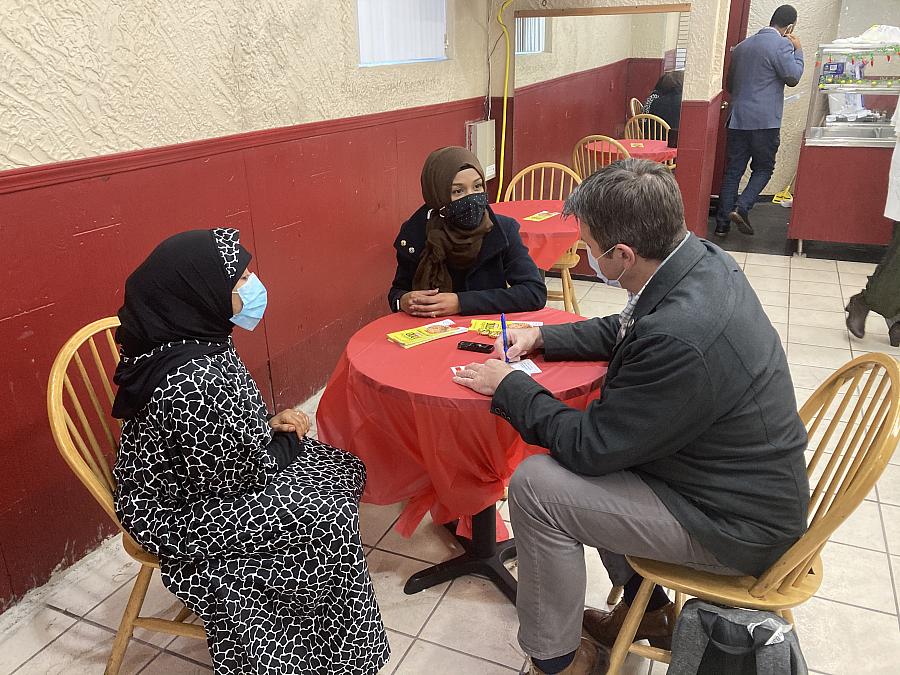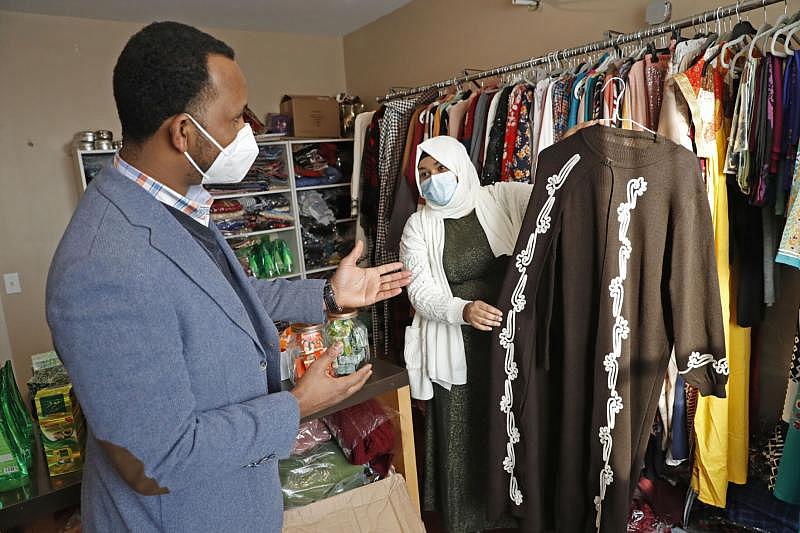What I learned about time, terminology and trust while covering refugees

Tim O’Shei interviews the owner of Mogadishu Food, a Buffalo, New York restaurant that is operated by refugees from Somalia.
(Photo courtesy Peter Ciotta)
When you’re a journalist trying to connect with people who are wary of sharing their story, texts like this one are reassuring:
“Hey Tim, (name redacted) said you could contact her. Here’s her email…”
“Another person agreed to speak with you! (Name redacted) said you could contact him at …”
I received those texts — edited slightly here for readability and context — last August, as I was beginning work on my reporting project for the Center for Health Journalism’s 2020 National Fellowship. I was working on a series of stories, supported through the Dennis A. Hunt Fund for Health Journalism, on refugees’ access to mental health care.
It’s a topic particularly relevant in Buffalo because of our vibrant refugee community. We’re a short flight or half-day drive from the international hub of New York City, and situated on the Canadian border only a couple hours from Toronto. Our reasonable real estate prices make it possible for people to build a comfortable life here, and New York state schools — while far from problem-free — offer a solid education.
Buffalo is a good place for a fresh start — but new beginnings don’t erase the trauma of refugees’ past. That point was raised to me in the fall of 2019, when I was working on a series of stories called “The Other Border” for The Buffalo News. Sister Judy Carroll, a mental health counselor based in Buffalo and just north of the border in southern Ontario, told me, “I don’t think you could be a refugee and not have issues.” Carroll, who specializes in working with refugees, shared multiple stories of the long-term impacts of trauma and loss of home and identity.

That became the seed of the idea for my project: What can we do better? And the resulting project taught me enduring insights as a reporter that impact how I talk about mental health and approach time, trust and terminology while covering refugees.
The answer is important here. Buffalo and its immediate suburbs are home to 66,000 foreign-born people. The region welcomed 474 people under the federal refugee resettlement program in 2019 — a steep drop from 2016, when under the Obama Administration nearly 2,000 refugees came here. With President Biden expanding the immigration numbers that the Trump Administration tightened, more people will likely be coming. But they’ll be doing it in the midst or aftermath of a pandemic and coming into a country with hotly polarized politics and several industries in rebuild mode. Reports of mental health symptoms and diagnoses are spiking across the country, particularly for depression and anxiety and, health experts predict, post-traumatic stress disorder as we emerge from the pandemic.
The ripple effect factors will only make the mental health challenges tougher. Americans who have lived here their entire lives are struggling. Imagine the impact on people who are fleeing war, violence, persecution or famine.
The urgency of exploring the issue of mental health care for refugees was clear. Providers, health administrators and resettlement agency executives were eager to talk about it. But refugees weren’t. That’s understandable: Mental health is among the most personal of issues, and people who came to the United States under trying circumstances largely feel vulnerable already. Language barriers are an issue, albeit a navigable one, with interpreters.
But there are other daunting obstacles faced by mental health care providers, and it turns out, by me as a journalist trying to talk to people about this subject:
• Terminology. Not everyone views “mental health” as a concern. In some cultures, mental health simply isn’t a thing. It’s just part of health. “We have to be careful how we say mental, because mental is taboo in some cultures — it doesn’t exist,” said Abdirahman Farah, practice manager at the Community Health Center of Buffalo, which performs health assessments on refugees. “In the Western world, they don’t really view the mental and the mind and the body as one,” added Farah, who also is part of H.E.A.L. International, a Buffalo nonprofit that supports refugees’ career preparation, and moved to the United States from Somalia. “They’re divided. But in other cultures, when somebody has physical pain, mental is included. It’s a whole.”
My lesson? I started referring more to “health care,” and a little less to “mental health.” That didn’t switch the focus at all — I always asked about wellness and mental-emotional matters — but it broadened both my language and my perspective.
• Trust. Building a connected relationship takes time, and the trajectory isn’t smooth. Amy Fleischauer, director of survivor support services at the International Institute of Buffalo, a refugee resettlement agency, told me about a refugee woman whom her team had been working with for a year and a half, trying to help her address domestic abuse. The woman and her counselors had been in close contact for several months — and then it stopped. “We’d get to a certain point, and then she would disappear — and then she’d come back” Fleischauer said. “This cycle happened.”
When the woman was asked about it, she said matter-of-factly, “I disappear every time you bring up child protection — making a (Child Protective Services) report — against my husband because everyone knows that CPS workers inject our children with a drug that makes them forget their mothers.”
Fleischauer’s staff quickly recognized the situation: The woman’s husband had been telling her that — and their words couldn’t simply undo the mistruth, especially not with the woman worried about her children’s brains being wiped of her memory. “So we focus on the relationship,” Fleischauer said. “We focus on the rapport and being useful to them even in really small ways, so we can gain their trust over time.”
As I worked on my project, it became increasingly clear to me that I, too, would have to earn trust step by step within the refugee community. This alone isn’t unusual — most of my work is longform and long-term and involves building relationships over time. That’s the only way to form a journalist-interviewee connection that allows your subject to fully open up.
The difference here is that it took time not just to build relationships, but even to get a response that opened the initial conversations. And, as I would learn, people view time through the lenses of vastly different experiences.
• Time. Here’s the thing about time: Refugees may view it differently than many of us, especially a deadline-driven journalist. That was mentioned to me repeatedly by many people, and explained to me helpfully by Dr. LaVonne Ansari, the CEO and executive director of the Community Health Center of Buffalo, which has a New York state contract to perform refugee health assessments. She instituted a policy of reframing the rules around time for medical appointments. Traditionally, if you have an appointment at 8 a.m. but don’t show up till 9 a.m., you won’t be seen. But at the Community Health Center of Buffalo, you will be.
“If I’m coming from a refugee camp, and I got from one side of the earth to the other side of the earth, we don’t understand the trauma that you’ve gone through — and there are no clocks in refugee camps,” Ansari said. “The notion that they have to be on time because we say that you have to be on time contributes to the stress level of not only the patient, but also the organization.”
For Ansari, it’s putting care and empathy above rigidity and details.
“We have to make sure that our systems are structured flexibly enough to understand how to relate to people’s different experiences,” she said. “Us saying, ‘Well you’re late, we can’t see you,’ also adds to the trauma that they just had.”
I quickly learned that I had to embrace that flexibility too, especially if I wanted to develop that vital trust with my potential sources. Because as it turns out, those excited texts I received in August from a contact within the refugee community didn’t pan out as I hoped. One of the people who I was told would be excited to speak to me never responded to multiple notes and messages. Another did respond, then disappeared for a while, and later reemerged for more conversation, followed by a bit of a drop-back, then another return. We had our own cycle going, and it’s one that over time, did develop a strong sense of trust — a faith in my willingness as a journalist to listen fully, report thoroughly, and treat the most personal of information with sensitivity.
Ultimately, my conversations within the upstate New York refugee community led me to that subject who was willing to share all, over a series of conversations: Kuresha Noor, a woman from Somalia who escaped an abusive marriage as a child in her home country, and later utilized the laws and protections of the American legal system to break out of an unsafe marriage here. Noor’s story, which captures that belief that mental health is health, was the lead in my project and provided a window into the strength and struggles that define the refugee journey.

